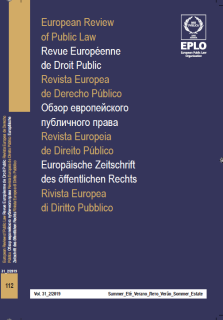
Constitutional Law / Droit constitutionnel
2018
The Netherlands / Pays-Bas
PhD Candidate in Constitutional Law at Utrecht University (m.j.vetzo@uu.nl)
The year 2018 was an eventful year in Dutch constitutional law. The Court of Appeal of the Hague issued its judgment in the Urgenda case and confirmed the order for reduction of greenhouse gases issued by the District Court of the Hague. The judgment gives rise to several constitutionally controversial questions concerning the relationship between courts and the political branches of state. Other noteworthy judgments relate to the question of which norms of international law rank supreme over conflicting domestic provisions and the separation of state and church in the Netherlands. Also, Brexit reached the Dutch courts in 2018 and raised issues of a constitutional nature (at least in first instance). From a legislative perspective, the repeal of the Advisory Referendum Act stands out, as does the referendum on the Intelligence and Security Services Act 2017. The definitive withdrawal of a proposal to introduce constitutional review, marks the provisional end of the debate on this issue, whereas the constitutional debate on introducing a system of elected mayors is likely to emerge in the next few years. Other constitutional issues were firmly put on the agenda by the final report of the State Commission on the Parliamentary System, which contained numerous recommendations to make Dutch democracy future-proof.
L’année 2018 a été riche en événements pour le droit constitutionnel néerlandais. La Cour d’appel de La Haye a rendu son arrêt dans l’affaire Urgenda et a confirmé l’ordonnance de réduction des émissions de gaz à effet de serre rendue par le tribunal de district de La Haye. L’arrêt soulève plusieurs questions constitutionnellement controversées concernant les relations entre les tribunaux et les branches politiques de l’Etat. D’autres jugements dignes d’être mentionnés portent sur la question de savoir quelles normes du droit international priment sur les dispositions nationales contradictoires, et sur la séparation de l’Eglise et de l’Etat aux Pays-Bas. Le Brexit a également été porté devant les tribunaux néerlandais en 2018 et a soulevé des questions de nature constitutionnelle (du moins en première instance). D’un point de vue législatif, ce qui ressort, c’est l’abrogation de la loi sur le référendum consultatif et le référendum sur la loi de 2017 sur les services de renseignement et de sécurité. Le retrait définitif d’une proposition de révision constitutionnelle marque la fin provisoire du débat sur cette question, alors que le débat constitutionnel sur l’introduction d’un système d’élection des maires devrait émerger dans les prochaines années. D’autres questions constitutionnelles ont été fermement mises à l’ordre du jour par le rapport final de la Commission d’Etat sur le système parlementaire, qui contenait de nombreuses recommandations visant à rendre la démocratie néerlandaise durable.





















